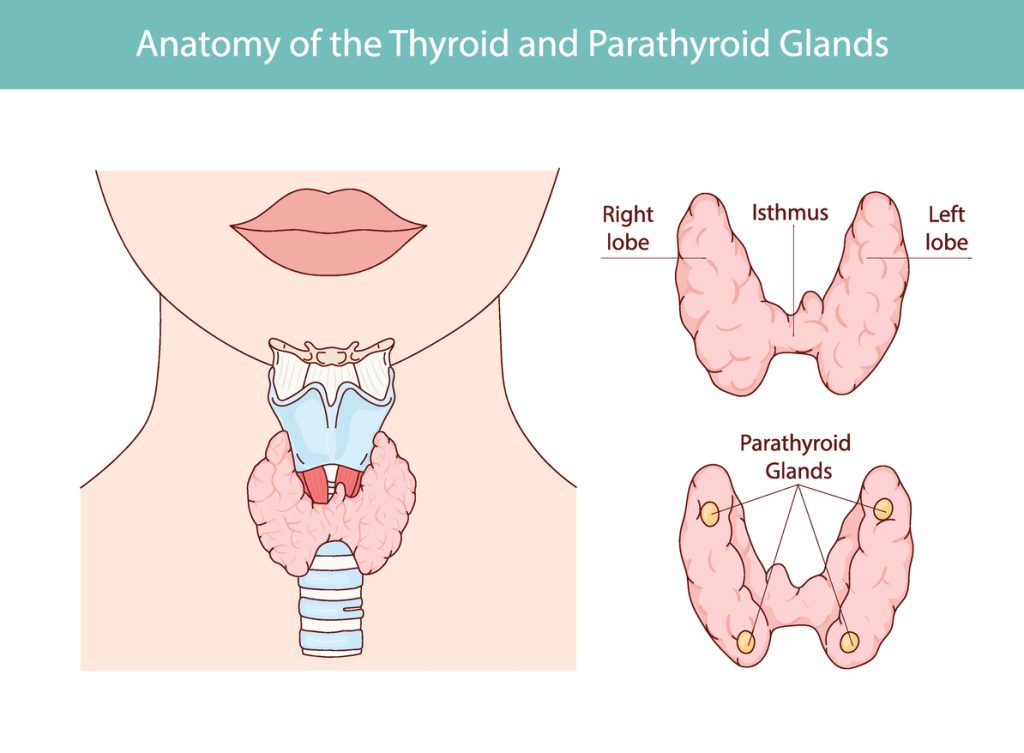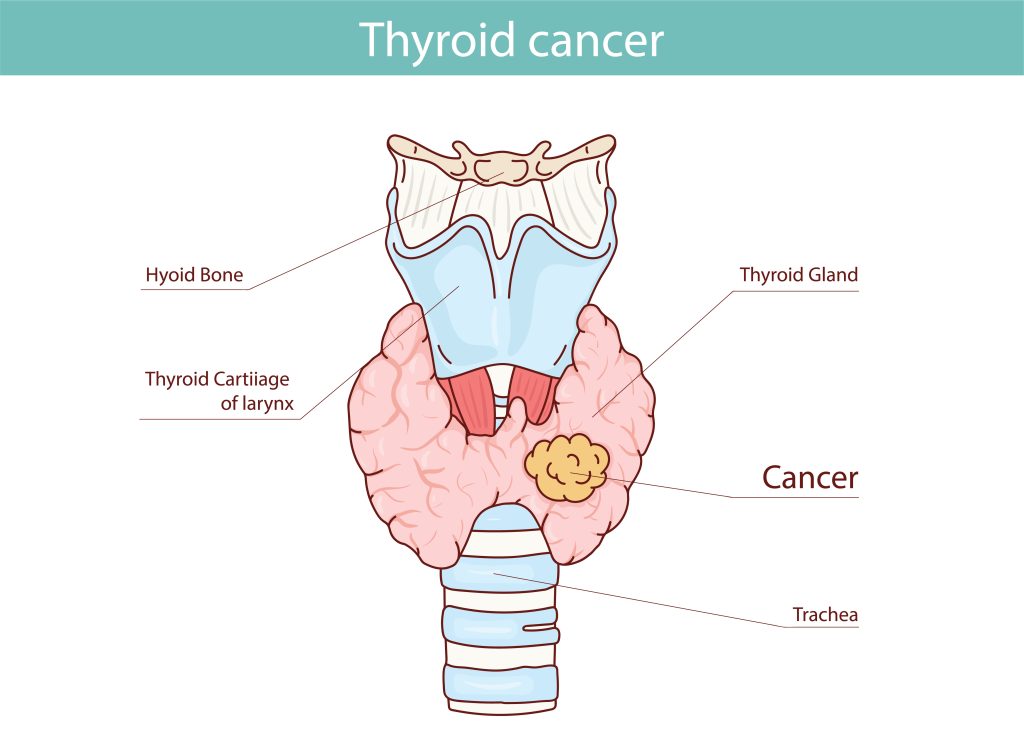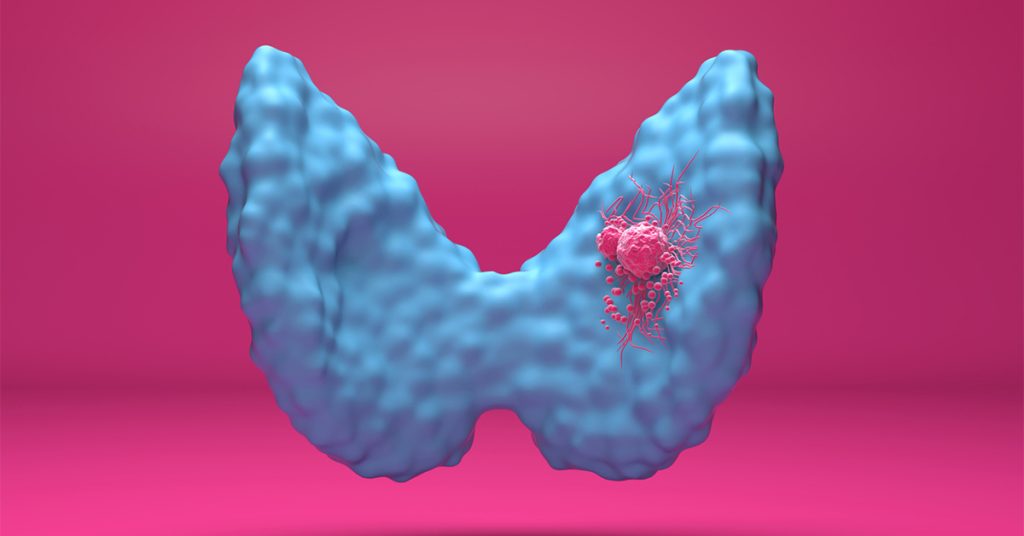September is Thyroid Cancer Awareness Month, a perfect time to learn about a disease that affects thousands. While less common than many other cancers, thyroid cancer is one of the most treatable, especially when caught early. Understanding the basics can help you to recognize the signs, ask the right questions, and be proactive about your health.
What is thyroid cancer?
Your thyroid is a small, butterfly-shaped gland located at the base of your neck. It produces hormones that regulate essential body functions like metabolism and heart rate. Thyroid cancer occurs when cells in this gland grow abnormally, forming a tumor.


In 2025, it is estimated that there will be 44,020 new cases of thyroid cancer and an estimated 2,290 people will die of this disease, according to the National Cancer Institute.
Although it can affect anyone, thyroid cancer is diagnosed more often in women and is most common between the ages of 30 and 50. In fact, over the past few decades, diagnoses in women have increased dramatically.
The four types of thyroid cancer
Not all thyroid cancers are the same. Understanding the type helps guide treatment and long-term outlook.
- Papillary: This is the most common type, making up about 80% of cases. It’s typically slow-growing and highly treatable.
- Follicular: The second most common type, often seen in middle-aged adults.
- Medullary: A rare form that can sometimes be hereditary.
- Anaplastic: A very rare and aggressive type of cancer.
How Is thyroid cancer detected?
Thyroid cancer often develops without obvious symptoms. Many cases are found incidentally during medical imaging for other issues or when a doctor feels a lump during a routine physical exam. If a potential problem is found, diagnostic steps may include:
- Neck exam: Your doctor will check your neck for any lumps or swelling.
- Ultrasound: This non-invasive imaging provides a detailed view of any nodules.
- Biopsy: A small sample of cells is taken and tested for cancer.
What You Can Do
Being proactive about your thyroid health is key. Here are a few simple steps you can take:
- Do a self-check: Stand in front of a mirror, tilt your head back, and swallow. Look for any bulges or asymmetry. Gently feel both sides of your neck for any lumps. If you notice anything unusual, schedule a medical evaluation.
- Ask for an exam: During your annual checkup, ask your doctor to perform a quick neck exam. It only takes a few seconds.
- Know your family history: Share with your doctor if thyroid cancer or other endocrine disorders run in your family.
- Follow up: Not all thyroid nodules are cancerous, but they should always be evaluated by a specialist.
When to see an ENT specialist
If your primary care provider or endocrinologist finds a suspicious nodule, an abnormal ultrasound, or biopsy results that suggest cancer, they will likely refer you to an ENT specialist like Minnesota ENT. We are specifically trained in diagnosing and surgically treating conditions of the head and neck, including thyroid cancer.
You should also consult with Minnesota ENT if you experience any of these symptoms:
- A persistent lump in your neck.
- Difficulty swallowing or a feeling of pressure in your throat.
- Hoarseness or voice changes that last more than two weeks.
- Enlarged lymph nodes in your neck.
Treatment and outlook
Most thyroid cancers are highly treatable, and the prognosis is excellent. Treatment options may include:
- Surgery: Partial or full removal of the thyroid gland.
- Radioactive iodine therapy: Used to destroy any remaining thyroid tissue or cancer cells after surgery.
- Thyroid hormone therapy: Helps replace essential hormones and prevent cancer recurrence.
- Targeted therapy or chemotherapy: Reserved for more advanced or aggressive cancers.
The five-year survival rate for thyroid cancer is nearly 98.4%, highlighting just how successful early diagnosis and treatment can be.
A Minnesota ENT Perspective
“Patients are often surprised to learn how treatable thyroid cancer is when it’s found early. Our role as ENTs is to guide you through diagnosis and treatment, often starting with surgery, and help you return to a healthy, active life.”
— Dr. Troy Hemme, Minnesota ENT
The bottom line
Thyroid cancer can be silent in its early stages, but with self-checks, routine medical exams, and prompt evaluation by an ENT when needed, it can often be treated successfully.
This month, take a few minutes to get familiar with your thyroid health—it could make all the difference. If you have any concerns, Minnesota ENT is here for you.
- Call us: 763-233-5755
- Text us: 763-265-6087
- Message us via our one-click chat tool.
Appointments available in Golden Valley, Maple Grove, and Robbinsdale

